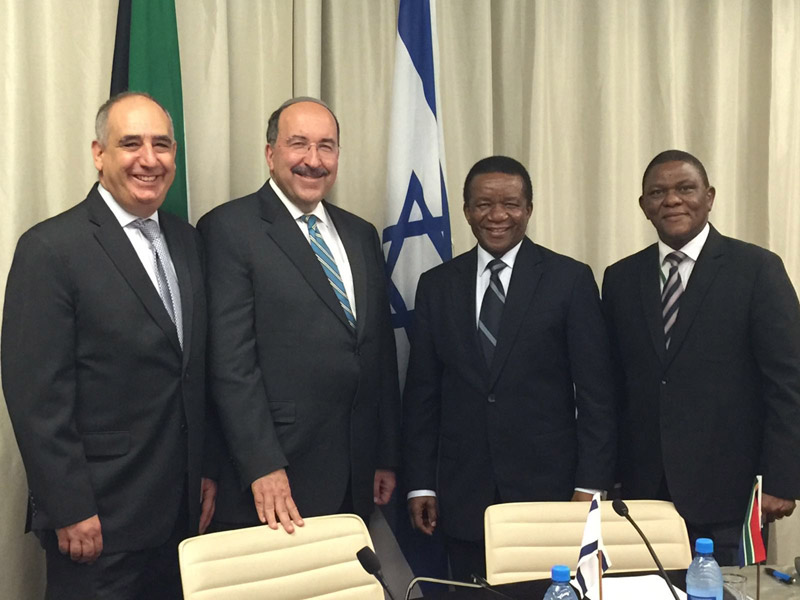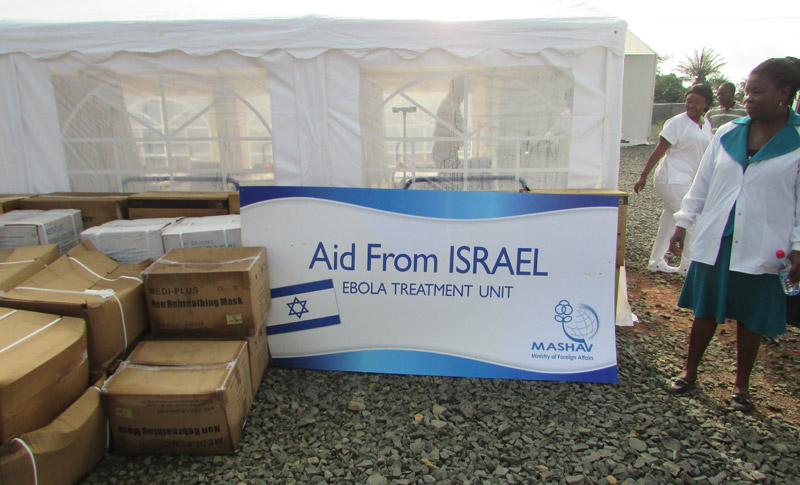"Israel is coming back to Africa; Africa is coming back to Israel. It's happening in a big way… It's happening because it's so clear that this is good for Africa and it's good for Israel." With these words, Israel's Prime Minister Benjamin Netanyahu launched (29 February 2016) the
new caucus for Israel-Africa relations at the Knesset (the Israeli Parliament).
The upcoming visit to South Africa by Dr. Dore Gold, the Director-General of Israel's Ministry of Foreign Affairs, is the first official visit since the Prime Minister's statement. Dr. Gold is due to arrive in South Africa on Thursday, 10 March 2016, to engage in dialogue with his counterpart, Jerry Matthews Matjila, the Director-General of South Africa's Department of International Relations and Cooperation. Dr. Gold will also meet with South Africa's Jewish community leaders and visit Soweto to pay tribute to the struggle against the Apartheid regime.
 Israel MFA DG Dr. Dore Gold with his South African counterpart Amb Jerry Matjila, with ambassadors Arthur Lenk and Sisa NgombaneCopyright: MFA
Israel MFA DG Dr. Dore Gold with his South African counterpart Amb Jerry Matjila, with ambassadors Arthur Lenk and Sisa NgombaneCopyright: MFAIsraelis and South Africans are actively engaged in a wide range of fields of cooperation and numerous projects which implement Israeli agricultural, water and medical technologies in South Africa. These projects not only directly benefit the local population by improving public health and food security, but they also create jobs and business opportunities, including the export of premium agricultural produce to Europe. Mutual trade between the two countries amounts today to about one billion dollars, and significant opportunities for further growth are expected to contribute to the economies of both countries.
Israel looks forward to working with South Africa in combining our rich experience in the field of development, in order to promote sustainable growth, development of water resources, adaptation to the challenges of climate change, food security, civil society empowerment and prosperity in Africa at large.
In the mid-20th century, as a young, newly independent country, Israel formed strong bonds with the young states of Africa, based on shared values and interests, with mutual cooperation for development being first and foremost among them. The relations suffered a setback in the 1970s due to extraneous political circumstances, and were revived with renewed impetus in the 1990s.
Beyond the physical proximity between Israel and Africa, they also face many common challenges, ranging from environmental issues emanating from climate change and drought, to security concerns, including the fight against terrorism, and cooperation in the field of cyber protection. These common challenges offer a fertile ground for strong mutual relations, to the benefit of all concerned.

Over the past few years, Israeli-African cooperation has soared in all fields. Recently, Israel had the honor of hosting the President of Kenya as well as the Foreign Affairs Minister of Rwanda (February 2016) and will shortly host the Foreign Affairs Minister of Ghana (March 2016). Upcoming visits include the Deputy Prime Minister of Ethiopia and more.
During his visit to Israel, Kenyan President Uhuru Kenyatta said "We in Kenya hold Israel as a dear and very special friend" (23 February 2016). Prime Minister Netanyahu has accepted President Kenyatta's invitation to visit Kenya, and will engage on a visit to several African countries in the summer of 2016, inter alia marking 40 years since
Operation Entebbe.
MASHAV in Africa: Fostering sustainable development
Africa as a continent is a priority for
MASHAV, Israel's Agency for International Development Cooperation. Israel's program of development cooperation in Africa is a moral commitment first undertaken by Israel’s first Prime Minister David Ben Gurion, who stated that "The principles of mutual assistance and equality should also constitute the basis for international relations between people." In 1958, then Foreign Minister Golda Meir visited Africa, heralding an era of trust and cooperation between Israel and the African continent.
MASHAV’s programs are based on a "train-the-trainers" approach to institutional and human capacity building, with professional training courses conducted in Israel and on-site.
One of MASHAV's leading projects in South Africa is TIPA - a family drip irrigation system based on the concept of the African Market Garden. It provides a small-scale horticultural production package based on low-pressure drip-irrigation, a mix of vegetables and tree crops, and a management package that leads to optimization of the production system. Benefits of using the system include water saving, higher yields of improved quality vegetables and fruits, the ability to produce crops year round and greater likelihood of maintaining the productive capacity of the soil. The mix of crops allows households to meet their own needs and sell excess in local markets.
The project is based on a participatory approach focused on the role of the community, and especially on women's associations and local community, as socio-economic development promoters. It creates a context for promoting gender mainstreaming related to the role of women in society, creating a ripple effect for sustainable development.